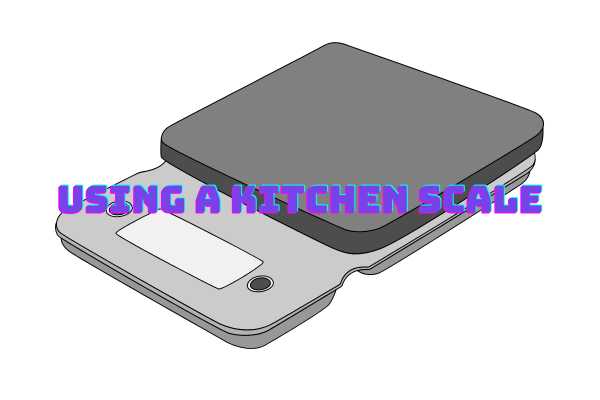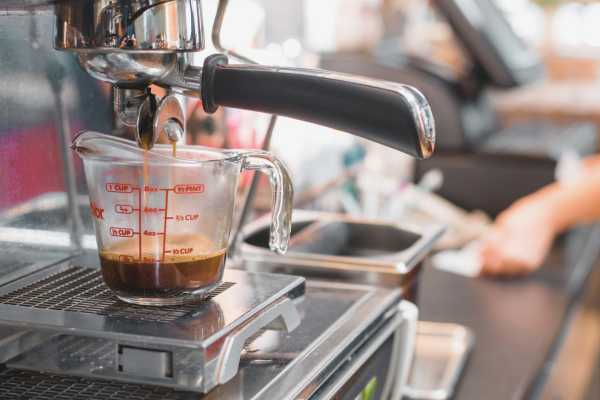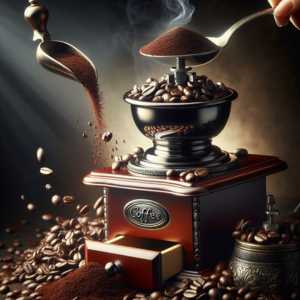If you’re looking to brew a delicious pot of coffee for a crowd, you may find yourself wondering, “How many scoops of coffee for 12 cups do I need?” Well, fret not, because we’ve got you covered. In this article, we will explore the ideal coffee-to-water ratio for a 12-cup pot, helping you achieve that perfect balance of aroma and flavor. So grab your coffee scoop and let’s dive in!
Calculating the Number of Scoops
When it comes to making coffee, getting the right coffee-to-water ratio is essential. Determining the number of scoops of coffee needed for a specific number of cups can seem confusing at first, but with a little understanding and some experimentation, you can find the perfect balance to suit your taste preferences.
Understanding the Standard Coffee-to-Water Ratio
The standard coffee-to-water ratio is commonly referred to as the “Golden Ratio” in the coffee-making world. It is generally recommended to use a ratio of 1:15 to 1:17, which means 1 part of coffee to 15-17 parts of water. This ratio helps achieve a well-balanced and flavorful cup of coffee.
Determining How Many Scoops of Coffee for 12 Cups
If you are brewing 12 cups of coffee, you can use the standard coffee-to-water ratio as a guideline. By multiplying the number of cups (12) by the number of parts of water (15-17), you can calculate the amount of coffee needed. For example, using a 1:15 ratio, you would need approximately 0.71 to 0.80 ounces (20 to 23 grams) of coffee.
Factors That Affect the Scoop-to-Cup Ratio
Several factors can affect the scoop-to-cup ratio, and it’s essential to consider these variables while determining the amount of coffee needed for your 12 cups.
Type of Coffee Beans
Different types of coffee beans have varying densities, which can affect the scoop-to-cup ratio. For example, lighter, more porous beans may require more scoops to achieve the desired strength, while denser beans might require fewer scoops. Experimenting with different bean types can help you find the right balance for your taste.
Roast Level
The roast level of the coffee beans also plays a role in determining the scoop-to-cup ratio. Darker roasts tend to have a bolder flavor, so you might need fewer scoops to achieve the desired taste. On the other hand, lighter roasts may require more scoops to achieve the same level of strength. Consider your preferred roast level when calculating the number of scoops needed.
Personal Taste Preferences
Everyone has different taste preferences when it comes to coffee. Some people prefer a stronger brew, while others enjoy a milder cup. It’s important to consider your personal taste preferences and adjust the scoop-to-cup ratio accordingly. Start with the recommended standard ratio and make adjustments based on your preferences.
Water Hardness
Water hardness can affect how flavors are extracted from the coffee grounds. Hard water, which contains high mineral content, can make the coffee taste more bitter or acidic. On the other hand, softer water might result in a weaker brew. If you have access to different types of water, you can experiment with using different water sources to find the perfect balance.
Using Measuring Tools
To ensure accuracy and consistency in your coffee brewing, it’s helpful to use measuring tools to determine the number of scoops needed.
Using a Standard Coffee Scoop
Most coffee scoops are designed to hold around 2 tablespoons (10 grams) of coffee. Using a standard coffee scoop can provide a convenient and straightforward way to measure your coffee. However, keep in mind that different scoops may have slight variations in size, so it’s essential to use the same scoop consistently.
Using a Kitchen Scale
For those who want precise measurements, using a kitchen scale can be a great option. By weighing the coffee grounds, you can ensure accuracy and consistency. Weighing your coffee also allows you to easily adjust the ratio based on personal preference, bean type, and roast level.

Using Measuring Cups
If you do not have a coffee scoop or a kitchen scale, you can use measuring cups to determine the number of scoops needed. Typically, 1 cup of coffee requires around 1.28 ounces (36 grams) of coffee grounds. So if you are brewing 12 cups, you would need approximately 15.36 ounces (432 grams) of coffee.
Alternative Methods
If you prefer a more convenient and precise method for calculating the number of scoops, several alternatives can help simplify the process.
Using a Coffee Calculator
Coffee calculators can be found online and are designed to help determine the coffee-to-water ratio based on the number of cups you want to brew. These calculators take into account factors like bean type, roast level, and personal taste preferences to provide a customized ratio. Simply enter the desired number of cups, and the calculator will generate the appropriate amount of coffee needed.
Using a Coffee Brewing App
For those who prefer using technology, coffee brewing apps can be a handy tool. These apps offer various functions, including built-in calculators that help determine the number of scoops based on the desired number of cups and other preferences. Additionally, coffee brewing apps often provide brewing guides, tips, and even recipe suggestions to enhance your coffee-making experience.
Using a Coffee Maker with Built-in Measurements
Some coffee makers are equipped with built-in measurements that make it easier to determine the right amount of coffee. These coffee makers may have indicators or markings indicating the amount of coffee needed for a specific number of cups. Using a coffee maker with built-in measurements can streamline the brewing process and eliminate the need for additional measuring tools.
Coffee-to-Water Ratio for 12 Cups
When brewing 12 cups of coffee, it’s helpful to know the recommended coffee-to-water ratios to achieve optimal results. Here are three commonly used ratios:
The 1:15 Ratio
Using a 1:15 coffee-to-water ratio, you would need approximately 12 ounces (340 grams) of coffee for 12 cups. This ratio provides a stronger brew with more pronounced flavors.
The 1:16 Ratio
The 1:16 ratio calls for around 11.25 ounces (318 grams) of coffee for 12 cups. This ratio offers a balance between strength and smoothness, ideal for those who enjoy a well-rounded cup of coffee.
The 1:17 Ratio
If you prefer a milder brew, the 1:17 ratio might be the right choice. This ratio requires approximately 10.59 ounces (300 grams) of coffee for 12 cups, resulting in a more delicate and subtle flavor profile.
Recommended coffee-to-water ratios 1:15 to 1:17
Adjusting the Ratio to Personal Preferences
Remember, the recommended coffee-to-water ratios are just starting points. Adjustments can be made to suit your personal taste preferences.
Increasing the Coffee-to-Water Ratio
If you prefer a stronger cup of coffee, you can increase the coffee-to-water ratio. Simply add an extra scoop or two of coffee for the desired number of cups. This adjustment will result in a stronger, more intense flavor profile.
Decreasing the Coffee-to-Water Ratio
On the other hand, if you find the coffee too strong or prefer a milder brew, you can decrease the coffee-to-water ratio. Reduce the number of scoops used while keeping the amount of water constant. This adjustment will produce a lighter and less intense cup of coffee.
Experimenting and Tasting
Finding the perfect coffee-to-water ratio for your 12 cups may require some experimentation and tasting. Here’s how you can refine your brew to match your preferences.
Testing Different Ratios
Start by brewing a small batch of coffee using different ratios within the recommended range. For example, you can try brewing three cups each using the 1:15, 1:16, and 1:17 ratios. This will allow you to compare the flavors and strengths of each brew.
Sampling the Coffee Strength
Taste each batch of coffee and pay attention to the strength and balance of flavors. Take note of any differences in aroma, acidity, sweetness, and bitterness. Keep in mind that personal preferences vary, so focus on finding the balance that you enjoy the most.
Making Adjustments
Based on your taste preferences, make any necessary adjustments to the scoops-to-cup ratio. If you prefer a stronger brew, increase the number of scoops, and if you prefer a milder brew, decrease the number of scoops. Keep experimenting until you find the ideal ratio that produces a cup of coffee you love.
Troubleshooting Weak or Strong Coffee
If you find that your brewed coffee is consistently too weak or too strong, there are a few adjustments you can make to correct the issue.
If the Coffee is Too Weak
If your coffee turns out weak and lacks flavor, consider the following adjustments:
- Increase the coffee-to-water ratio: Add an extra scoop or two of coffee for the same amount of water.
- Adjust your brewing time: Brew the coffee for a longer duration to extract maximum flavors.
- Use freshly roasted coffee beans: Freshly roasted beans tend to deliver a more robust flavor profile.
If the Coffee is Too Strong
If your coffee is consistently too strong and overpowering, try the following remedies:
- Decrease the coffee-to-water ratio: Reduce the number of scoops used while keeping the water amount constant.
- Adjust your brewing time: Brew the coffee for a shorter duration to reduce the extraction of strong flavors.
- Experiment with lighter roasts: Lighter roasts generally have a milder taste compared to darker roasts.
Additional Tips and Considerations
To elevate your coffee brewing experience and ensure the best possible flavor, consider the following tips and factors:
Using Freshly Roasted Beans
Coffee beans are at their peak freshness shortly after being roasted. Using freshly roasted beans can enhance the flavors and aromas in your cup of coffee. Look for a local roaster or specialty coffee shop that offers freshly roasted beans for the best results.
Grinding Coffee Beans Before Brewing
For optimal flavor extraction, it’s recommended to grind your coffee beans just before brewing. Grinding exposes more surface area, allowing the water to extract flavors more efficiently. Invest in a good-quality burr grinder for a consistent grind size and flavor profile.
Taking into Account Coffee Absorption
It’s important to note that coffee grounds absorb water during the brewing process. This means that the final volume of brewed coffee may be slightly less than the amount of water initially used. Keep this in mind when calculating the number of cups and adjust as necessary.
Considering Brewing Methods
Different brewing methods may require slight variations in the coffee-to-water ratio. For example, pour-over methods may require a finer grind and a higher coffee-to-water ratio compared to French press brewing. Experiment with different brewing methods and adjust the ratio accordingly.
Conclusion
Calculating the number of scoops of coffee needed for 12 cups can be customized to cater to your taste preferences. Understanding the standard coffee-to-water ratio, considering factors such as type of beans, roast level, and personal preferences, and utilizing measuring tools or alternative methods can help you achieve the perfect cup of coffee every time. Remember to experiment, taste, and make adjustments until you discover the ideal coffee-to-water ratio that satisfies your palate.
Continue Reading…
- Discover How Much Caffeine In An Espresso Shot
- Starbucks Cup Sizes – How to Choose Your Perfect Cup Size
- Decoding Ristretto vs Long Shot: Unveiling the Secrets of espresso
- Easy Whipped Coffee Recipe – Elevate Your Morning Routine
- Tips for Perfect Heavy Whipping Cream in Coffee Experience
- Can You Eat Coffee Grounds? Facts, Safety and Benefits
- Is Coffee Good For Sore Throat? Discover the Effects
- Discover How Long Does Coffee Last? 6 Smart Storage Tips
- Perfect Coffee Mug Sizes – How Many Ounces Is A Coffee Mug



